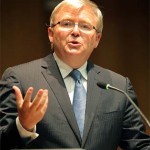EUTHANASIA – ENDING A LIFE “AHEAD OF TIME”
Readings: Psalm 139:16-20; Genesis 2
SERMON NOTES
Introduction
1. The Dutch experience clearly demonstrates the disastrous effects of euthanasia legislation.
a. The former Dutch minister who successfully promoted the legalization of euthanasia has now admitted that the government’s move was a mistake, and says that they should have first focused on palliative care. In 2008, Dutch doctors reported 2,331 cases of euthanasia, 400 cases of assisted suicide, and 550 deaths without request.
b. The Dutch are now holding an inquiry into the effects, both intended and unintended, of the euthanasia legislation.
2. Not a lot of biblical commentary on this issue directly.
Some related themes are clear. Some are not directly presented!
We want to introduce the biblical evidence that is clear in order to think a bit about the implications of some of the unclear issues.
Respect for life–a biblical perspective on some of the issues
God created life Genesis 1-2; Psalm 139:13-14; Isaiah 44:2, 24
Life is special and worthy of special care, because God created it.
Human life has special value, because we are created in the image of God. Genesis 9:5-6
The value is based on the image of God in a person; NOT on their health or quality of life
God’s sovereign control of life Psalm 39:4-7; Isaiah 43:1-3; 44:2, 24; 46:3-4
God loves the suffering person more than we do! We can trust God.
Psalm 116:15; 1 Peter 5:7
Seeing life as God sees it. James 4:13-15; Matthew 6:25-27
Perspective from Philippians 1
God takes some offensive and evil misconduct, and uses it for good
Philippians 1:6, 12-13, 14-18, 20-26
If to live is Christ, to die is gain. Phil. 1:20-21
To die is better than to live (always!! Reverse of popular view) Phil. 1:22-23
So, why would we CLING to the dying?!!
God is still in charge! Phil. 1:23-26
God will decide what’s best for us – in accordance with His loving purposes!
Series of “God-given paradoxes”“
Taking of life is sin and deserves death.
(Even trying to take your own life is an attempt to improve our life over God’s will for our life! That’s pride.
The person who CLINGS to his life, ultimately loses what he or she is clinging to. Mark 8:35-36
Letting go of our life results in obtaining life. John 12:25
Giving up your life for a friend is the ultimate demonstration of love. John 15:13; Romans 5:6-8
“Thou shalt not kill” Exodus 20:13; 21:12; Matthew 5:21-22; 19:18
Biblical perspective on suicide.
Taking the will of God into our own hands.
Pride of assuming we have a better plan than God’s plan for our life.
When society decides whose life is “worth living”
This is a right the sovereign God keeps for Himself.
That call is not OURS to make.
We can trust God to decide when our life isn’t worth living.
The dilemma of modern medicine–“Because we can!”
Our word is not the last word
The hardest decision – helpful comment from John Kilner, Life on the Line:
Three issues to deal with in this discussion: [Calls for this kind of thinking:]
1. God-centered
2. Reality-bounded
God intended implications, built in to the way God made things (whether we like it or not!).
3. Love-impelled
Distinction between ending a life–allowing a life to come to an end and deciding not to keep trying to extend it artificially.
Disconnecting life support.
Not ending life to escape from a hard life.
Job’s perspective is significant: Ending life is a call that only GOD should make! Job 1:21
Distinction between disconnecting life support and starving someone to death.
The problem with feeding tubes: Starving someone to end the pain.
Releasing a dying person–why would we cling?!!
Compassion and grace for people who have to make the call.
A time for compassion – NOT for criticism!
Further thoughts, Is euthanasia a morally acceptable way to ease suffering of the elderly?


